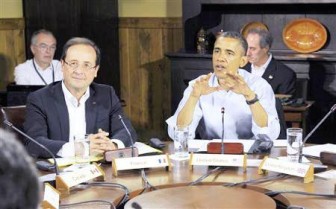CAMP DAVID, Md, (Reuters) – World leaders backed keeping Greece in the euro zone yesterday and vowed to take all steps necessary to combat financial turmoil while revitalizing a global economy increasingly threatened by Europe’s debt crisis.

A summit of the G8 leading industrialized nations came down solidly in favour of a push to balance European austerity – an approach long driven by German Chancellor Angela Merkel – with a new dose of US-style stimulus seen as vital to healing ailing euro-zone economies. But it was clear that divisions remained.
“We commit to take all necessary steps to strengthen and reinvigorate our economies and combat financial stresses, recognizing that the right measures are not the same for each of us,” the leaders said in a joint statement issued at their meeting at the Camp David presidential retreat in Maryland.
The message sent by the summit hosted by President Barack Obama reflected his own concerns that the euro-zone contagion, which threatens the future of Europe’s 17-country single currency bloc, could hurt the fragile US recovery and his re-election chances in November.
In their final economic communique, the Group of Eight leaders endorsed calls to broaden Europe’s focus to more pro-growth remedies and said: “We reaffirm our interest in Greece remaining in the euro zone while respecting its commitments.”
It was unusual for the often-bland G8 communique to single out a relatively small nation. But fears that a political stalemate in Greece would lead to its departure from Europe’s monetary union at unknown costs to the financial system and global economic stability have spooked markets.
Spain too has roiled markets by revealing huge bad loans in its banking system as it struggles to rein in its budget while facing recession.
Merkel, increasingly isolated by a French-led push for a more growth-oriented approach, sought to play down the differences, saying: “Solid finances and growth belong inseparably together and should not be put into contrast.”
Obama, who has pressed Europe for more growth-boosting measures like those he pursued at home, used his closing statement to remind euro-zone leaders that the stakes were high and there could be “enormous” costs to the global economy if they failed.
“Growth and jobs must be our top priority,” he said, reaffirming his view that Europe has the capacity to meet the challenge.
Marc Chandler, currency strategist at Brown Brothers Harriman, said: “It is significant that a group as weighty as the G8 backs Greece and reinforces the idea that Europe needs a strong union. It strengthens its hand.”
In another move to shore up shaky global growth, the G8 leaders said they would monitor oil markets closely and stand ready to seek an increase in supplies if needed. While crude oil prices have declined by 10 percent over the past month, the threat of sanctions on Iran loom next month.
The G8 said the global economic recovery shows promising signs but “significant headwinds persist.”
The mountain cabins at Camp David where a shirt-sleeved Obama hosted the G8 leaders contrasted with recent tense meetings in European capitals about a sovereign debt crisis that just keeps getting worse.
The economic communique endorsed a recent political shift away from the budget-cutting austerity that has been championed by Merkel and British Prime Minister David Cameron as the route to prosperity.




